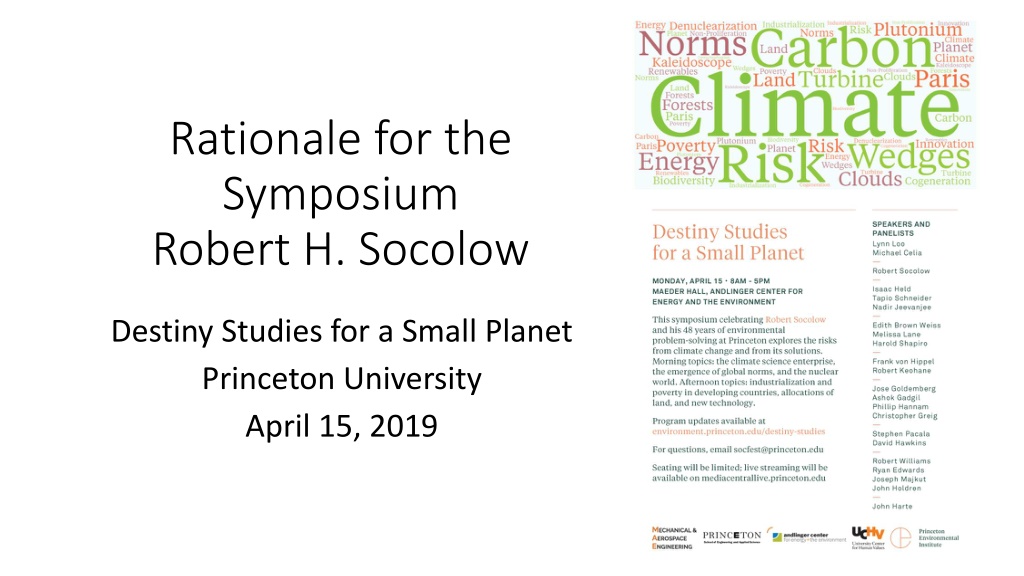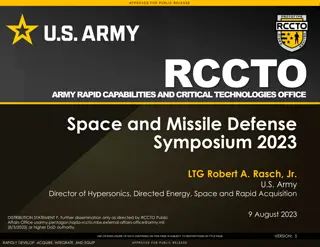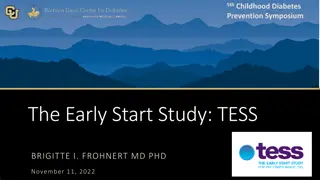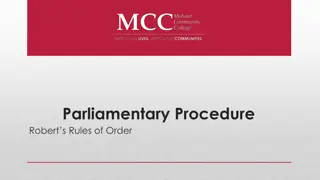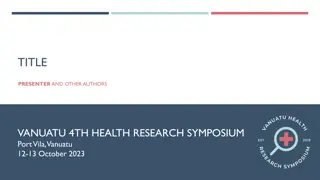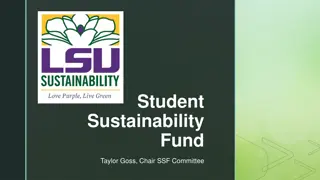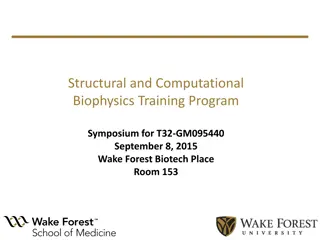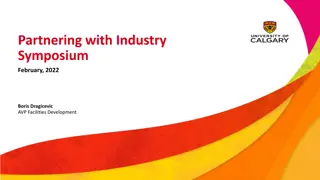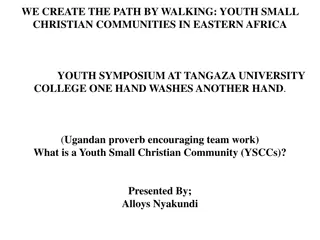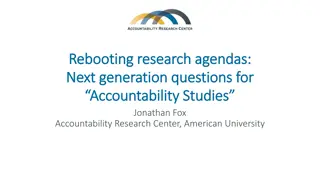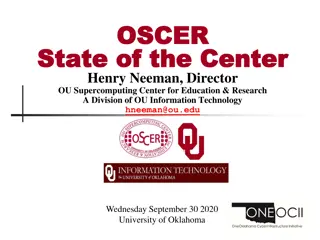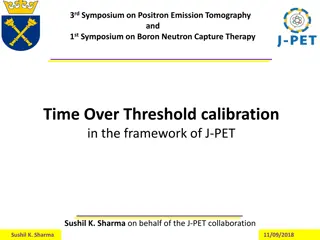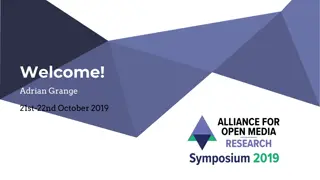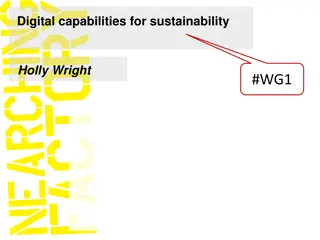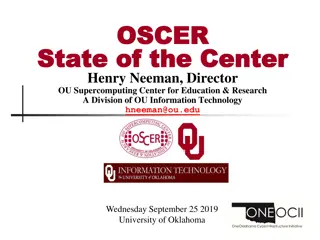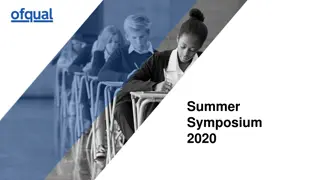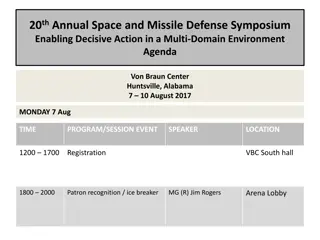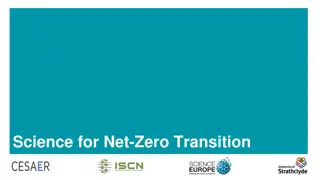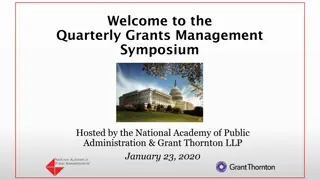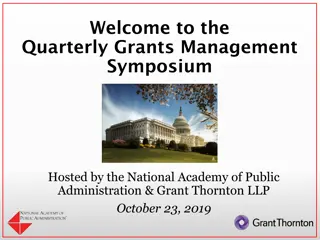Influencing Future Sustainability Research Agendas: Rationale Behind the Symposium by Robert H. Socolow
Robert H. Socolow, in his symposium at Princeton University, aims to gather top colleagues to address pressing environmental issues. He emphasizes advancing the sustainability conversation and influencing research choices of young academics. Socolow highlights Destiny Studies, the urgent need for a better understanding of our collective future, and the metaphor of a small planet burdened by human impacts. His goal is to shape interdisciplinary environmental research and confront the challenges of modernity.
Download Presentation

Please find below an Image/Link to download the presentation.
The content on the website is provided AS IS for your information and personal use only. It may not be sold, licensed, or shared on other websites without obtaining consent from the author. Download presentation by click this link. If you encounter any issues during the download, it is possible that the publisher has removed the file from their server.
E N D
Presentation Transcript
Rationale for the Symposium Robert H. Socolow Destiny Studies for a Small Planet Princeton University April 15, 2019
What a privilege! I have been allowed to gather together many of the colleagues I most admire to discuss some of our planet s most pressing problems. Top 5 words: Climate, carbon, risk, wedges, norms. Second 5: Energy, Turbine, Paris, Clouds, Plutonium. Remaining 12 (the words get longer!): Kaleidoscope, Poverty, Denuclearization, Biodiversity, Cogeneration, Industrialization, Forests, Renewables, Land, Planet, Innovation, Non-proliferation.
Looking mostly forward, very little back Most late-career celebrations are a review of the celebrant s work, decade by decade. But some, like this one, are driven by a desire to influence future research agendas. A half-century has passed, and I have a tremendous sense of unfinished business. My goal for this symposium is to advance the sustainability conversation generally and, in particular, to influence the research choices of many young and mid-career people here.
Destiny Studies In my lifetime we have gained a qualitatively better understanding of the histories of our Universe, our Earth, and life: the Big Bang, seafloor spreading, and DNA. The task of the next decades is to achieve a qualitatively better understanding of our collective future. This is the domain of Destiny Studies. Citations: https://map.gsfc.nasa.gov/media/121238/index.html; https://www.lee.k12.nc.us/cms/lib/NC01001912/Centricity/Domain/2042/sea-floor-spreading-diagram-kids.jpg:
A small planet A planet bursting its seams as modernity goes global. I used to collect N/D calculations: N (the numerator) is an effect caused by humans, and D (the denominator) is a related measure of what happens without us. N/D is about one tenth-thousandth when the heating of Earth by burning fossil fuels is compared to the heating by the Sun. N/D is about one when nitrogen fixation in fertilizer factories is compared to fixation by bacteria in soils. We wish we lived on a Jupiter-sized Earth. Another metaphor
Conversations As some of you know, Princeton in 1971 decided to create one entirely new faculty position for someone to figure out what interdisciplinary environmental research might look like. When I arrived, I was told: Infect the disciplines. Aaron Lemonick, Dean of the Faculty Confront the hardening of the categories. George Reynolds, Professor of Physics and the first Director of the Center for Environmental Studies. I think I am half-way there.
The six conversations Nuclear power Developing countries Each of the conversations is among people wrestling with similar issues in importantly different ways. Planetary norms Humans in nature I nudged. But these are their conversations. It will all be as new for me as for you. Climate science Low-carbon Technology AM PM
Conversation #1: Climate science and risk management Who s conversing? Three climate scientists from three generations, all asking deep questions about how to learn faster. Some questions: Climate science is our searchlight. How good is it already? What limits its progress? How valid is the charge that climate science is driven by ideology? Climate science
Conversation #2: The emergence of planetary norms Who s conversing? An international lawyer with World Bank experience and a political scientist specializing in Greece and Rome, meeting for the first time. The session chair is an economist who has run two universities. Planetary norms Some questions: How have norms been universalized in the past? Are nations today already developing common rules and associated institutions? How might planetary norms facilitate climate change management?
Conversations #3, #4, #5: The risks of zeal I always feel a bit of a curmudgeon when I say: The lowest conceivable greenhouse targets, achievable only by casting caution to the winds, are not optimal. But it s true, and conversations #3, #4, and #5 provide examples of the fateful trade-offs. A greater chance of nuclear war Nuclear power Developing countries A slower pace of economic development Simplifying the natural world by managing it exclusively for our benefit. Humans in nature We need two-sided reasoning, where the risks of both climate change and its solutions are side by side.
Conversation #3: Nuclear power and its discontents Nuclear power Who s conversing? A physicist who keeps pressing the nuclear establishment to make nuclear power safer and proliferation-resistant. An international political scientist who urges his colleagues to address climate change. Some questions: A major expansion of global nuclear power could delay climate change. With what risks? How might these risks be substantially lowered?
Conversation #4: Developing-country dominance Who s conversing? The physicist who spearheaded Brazil s sugar- cane ethanol program. An inventor helping the world s poorest people. A World Bank young professional in Asian energy. A businessman turned academic driven to understand what limits the pace of change. Developing countries Some questions: How quickly can low-carbon industrialization displace conventional uses of coal and oil? Can the alleviation of abject poverty be addressed separately from climate change?
Conversation #5: Wedges from the biosphere Who s conversing? An ecologist and an environmental lawyer, both working to assure that land-based climate- change strategies are effective and do not undermine biological diversity and food supply. Humans in nature Some questions: How promising are various land- management strategies for slowing climate change? What policies can promote those strategies? What conditions could assure their overall environmental benefit?
Conversation #6: Energy technology and policy Who s conversing? An energy analyst who invents energy strategies that integrate fossil and renewable energy. Two freshly minted Ph.D. scientists shaking up the Hill. The President s science advisor from the distant past. Some questions: What policies could accelerate the commercialization of CCS , where the CO2 byproduct of burning does not get to the atmosphere? What synergisms are possible between CCS and renewable energy? Low-carbon Technology
After the conversations: reflections from John Harte Published in 1971 It is ominous that our capacity to change our global climate has outrun our understanding of what is happening. (p. 294) Used $4.21 New $131.41
After the conversations: reflections from John Harte 412 ppm Feb 2019 * Published in 1971 324 ppm Feb 1969 * We haven t yet bent the curve. 2/3 of the increase since pre- industrial times occurred in the past 50 years. So much to do! Used $4.21 New $131.41
